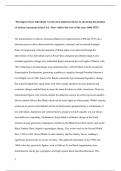‘The impact of key individuals was the most important factor in advancing the position
of African Americans in the USA.’ How valid is this view of the years 1860-1970?
The advancement of African American (Black) civil rights between 1860 and 1970 was a
laborious process often characterised by stagnation, resistance and occasional triumphs.
Peaks of progression in the development of Black rights were achieved through the
intervention of key individuals such as Rosa Parks, alongside presidential support and
resultant legislative change. Key influential figures advanced the civil rights of Blacks, with
1863 witnessing a pivotal change in government policy with President Lincoln issuing the
Emancipation Proclamation, generating a pathway to equality through President Johnson’s
Civil Rights Act of 1968. Success for Blacks consisted of governmental legislative change
that acknowledged their equal status with white people and these de facto political and
economic changes enabled them to enjoy the same freedoms as white Americans. However,
instrumental figures, like Lincoln, despite his apparent concern for achieving racial equality,
did not entirely believe that Blacks deserved the same rights as white people. Whilst America
witnessed an uneven and turbulent period of advancement perpetuated by a combination of
key individuals, legislation and external factors, progress towards equality was not always
inexorable nor compelling. Furthermore, King failed to influence change in the North,
whereas unsung grassroots campaigners enrolled in the Black Power Movement, such as the
Black Panther Party, helped to promulgate change. Key events such as the Second World
War, 1939 to 1945, forced Blacks to enter industry and the military forces, enabling a
significant advancement in society for them. This gathered momentum in the 1950s and
1960s when key grassroots figures, such as Malcom X, and black organisations were
determined to end de jure segregation and fight against black disenfranchisement. This
1
,decade was a turning point for black civil rights prompted by the surge of key individuals
campaigning for both legislative and social changes with regards to racial equality. Alongside
this, Supreme Court rulings and grassroots figures demonstrably advanced the position of
Blacks.
From 1881, de jure segregation was introduced in the Southern states and key figures fought
against racial discrimination to advance civil rights and challenge its legality. In a public
speech by Booker T. Washington at the Atlanta Exposition in September 1895, Washington
addressed the rise of Jim Crow Laws and appealed for a policy of accommodation,
establishing a preaching tone of self-help and racial solidarity. Due to Washington’s position
as an educator and reformer, the source is valuable as he reflects on black economic
advancement as a means of achieving equality. Born into slavery, Washington elevated
himself out of repression through education and enterprise, contributing to the value of the
source. Establishing the Tuskegee Institute enabled him to secure funds to support his
accommodationist philosophy and gives his speech value, advising against protest, fearing it
alienates white people.1 Washington’s over-arching belief was that Blacks should eschew
political protests in favour of education and industry, reinforced when he argues, ‘cast it
down in agriculture, mechanics…and in the professions’.2 His rhetoric argues that his ‘race’
should start ‘at the bottom’ in life, advocating for an acceptance of segregation.3 However,
the source seems limited as it deviates from the views of protestors like DuBois and King.
Due to his ameliorative experience of white people, Washington’s perception of white people
is arguably more favourable, resulting in his polarised approach, limiting the value of the
source. Whilst he was a prominent grassroots figure, it is hard to calculate whether his
philosophy fostered sympathy for civil rights or resulted in any ground being gained as he
1
Karson, J. The Civil Rights Movement, pp.24-29.
2
Ibid
3
Ibid
2
, refused to speak out publicly against lynching, despite having access to presidents and
politicians. It is valuable to my investigation as it shows the path to racial equality was not
linear, illustrating the continuous stagnation of racial equality. However, the speech fails to
spotlight Washington’s opposition, which arguably jeopardised the campaign and polarised
Blacks, hampering the progression of civil rights, which limits the validity of the source.
Influential figure, Du Bois was critical of Washington’s approach stating that it would
‘perpetuate white oppression’.4 In an interview with McGill, Du Bois suggested Washington
‘abandoned all political and social rights’ and opposed the Atlanta Compromise, arguing that
it was a betrayal of black rights.5 To some historians, Washington created trust between
Blacks and Whites which helped de facto segregation to be implemented. Clark Howell,
editor of the Atlantic Constitution, stated that the speech was ‘the beginning of a moral
revolution in America’.6 This adds value to the source because it led to him being appointed
as an advisor to Roosevelt, so as an individual he had significant influence over policies.
Additionally, the source is valuable as it provides an alternative interpretation of alleviating
the repression of Blacks, revealing it was more ‘important and right that all privileges of the
law be’ theirs.7 However, the source is limited as it was written for a white audience
emphasising Washington’s desire to appease white Americans who feared the accumulation
of rights for Blacks. Whilst the source has some limitations, Washington’s speech is valuable
overall because it highlights the limited extent of progression as in 1895 this was seen as
revolutionary as it was one of the first key speeches, marking a pivotal moment in the
continuous change of racial equality.
4
Frontline, The Debate Between W.E.B. Du Bois and Booker T. Washington.
5
The Atlantic Online, W.E.B Du Bois.
6
New Georgia Encyclopaedia, Atlanta Compromise Speech.
7
Karson, J. The Civil Rights Movement, p.28.
3




